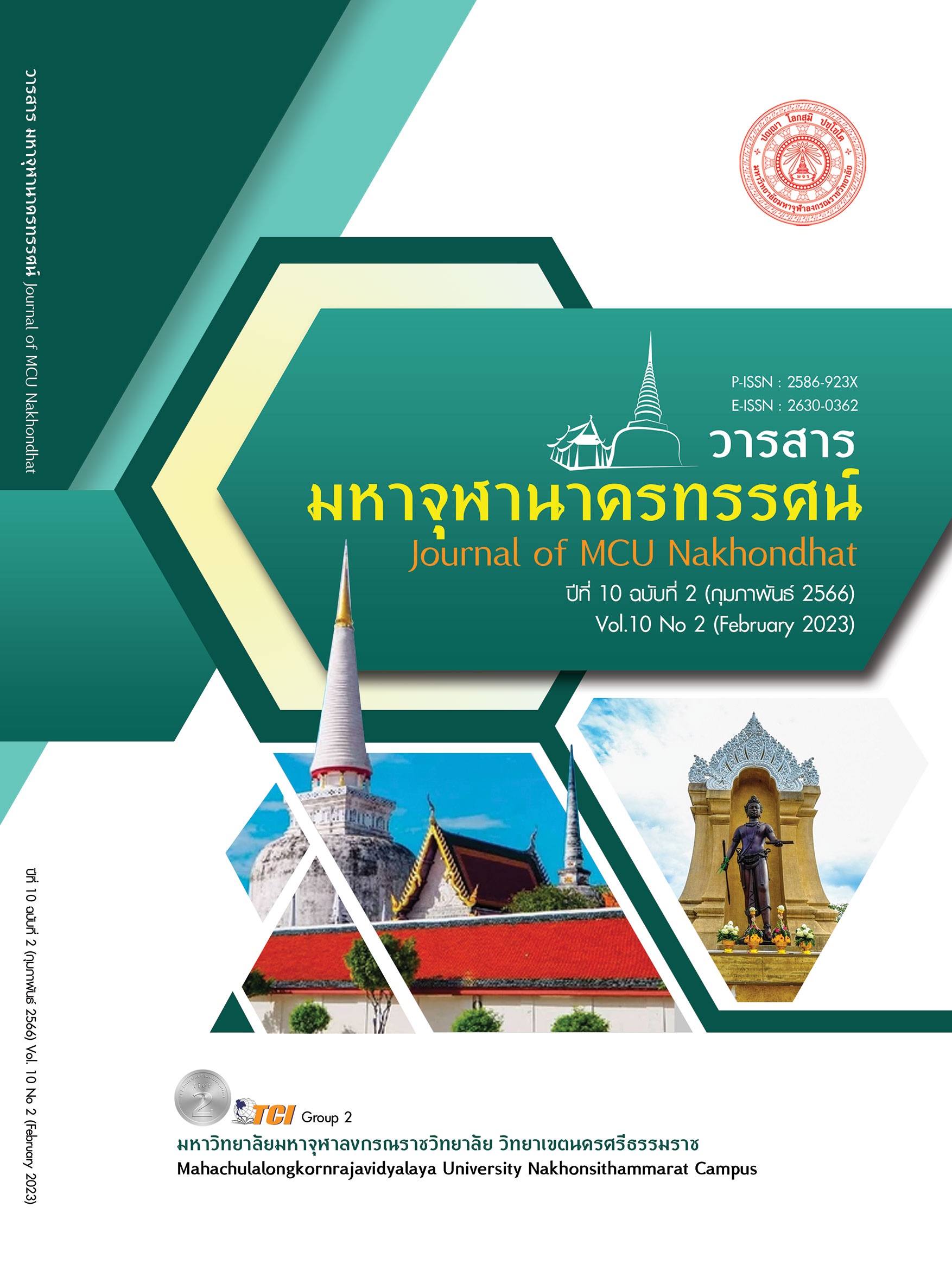THE ENHANCEMENT OF PROBLEM SOLVING SKILL BY INSTRUCTIONAL MODEL BASED ON SERVICE LEARNING WITH PROBLEM BASED LEARNING FOR STUDENTS IN AN ENVIRONMENTAL IMPACTED AREA
Main Article Content
Abstract
The objective of the research was to enhancement of problem solving skill by instructional model based on service learning with problem based learning for students in an environmental impacted area. The sample population was the class of 26 students of grade 12 in the Science and Maths program of Wiangkaen Wittayakhom School of the Secondary Educational Service Area Office Chiangrai the 1st semester of the education year 2022, using the Cluster Random Sampling Method. Various tools were employed to do the research which included 1) Instructional model based on service learning with problem based learning to enhance problem solving skill for students in an environmental impacted area. 2) Problem solving skill evaluation form. Other tools included data analysis, arithmetic mean, standard deviation, percentage and independent t-test. The research findings indicates that all participating students had higher problem solving skills after the class conducted using the Instructional model based on service learning with problem based learning to enhance problem solving skill when compared prior to the research, at a statistical significance of .01. furthermore, it was found that problem solving skills during studying with the Instructional model based on service learning with problem based learning to enhance problem solving skill for students in an environmental impacted area, in overall, was very high at an average of 4.27 which was 85.40 percent. As for students’ behaviour and characteristics, the researcher found that the students showed the highest level compared to other categories at 4.66 or 93.20 percent. Other characteristics which include problem analysis, strategic planning to solve problems, applications of problem solving skills to solve real world context, ability to identify related problems and the ability to summarize the result of problem solving were all at high levels at 85.80 percent, 84.80 percent, 83.40 percent, 83.00 percent and 82.20 percent respectively.
Article Details

This work is licensed under a Creative Commons Attribution-NonCommercial-NoDerivatives 4.0 International License.
References
กรมส่งเสริมคุณภาพสิ่งแวดล้อม. (2556). แนวทางสร้างสรรค์ Eco School โรงเรียนสิ่งแวดล้อมศึกษาเพื่อการ พัฒนาที่ยั่งยืน. เรียกใช้เมื่อ 17 พฤษภาคม 2562 จาก http://www.deqp.go.th/media/36848/development-resize.pdf
กระทรวงศึกษาธิการ. (2551). หลักสูตรแกนกลางการศึกษาขั้นพื้นฐาน พุทธศักราช 25. กรุงเทพมหานคร: โรงพิมพ์ชุมนุมสหกรณ์การเกษตรแห่งประเทศไทย จำกัด.
กัญญาวีร์ ชายเรียน. (2559). การพัฒนารูปแบบการเรียนการสอนวิชาชีววิทยาโดยใช้ปัญหาเป็นฐานตามแนวคอนสตรัคติวิสต์เพื่อเสริมสร้างความสามารถในการคิดแก้ปัญหาสำหรับนักเรียนชั้นมัธยมศึกษา ตอนปลาย. ใน ดุษฎีนิพนธ์การศึกษาดุษฎีบัณฑิต สาขาหลักสูตรและการสอน. มหาวิทยาลัยนเรศวร.
ทิศนา แขมมณี. (2555). ศาสตร์การสอน: องค์ความรู้เพื่อการจัดกระบวนการเรียนรู้ที่มีประสิทธิภาพ (พิมพ์ครั้งที่ 11). กรุงเทพมหานคร: ด่านสุทธาการพิมพ์.
ธารา บัวคำศรี. (2561). 3 ประเด็นสิ่งแวดล้อมปี 2561 ไม่ควรพลาด. เรียกใช้เมื่อ 10 ตุลาคม 2564 จาก https://www.greenpeace.org/thailand/story/1774/3-environmental
บุญชม ศรีสะอาด. (2553). การวิจัยเบื้องต้น. (พิมพ์ครั้งที่ 8). กรุงเทพมหานคร: สุวีริยาสาส์น์.
ประสาท เนื่องเฉลิม. (2558). การเรียนรู้โดยการบริการสังคม Service Learning. วารสารวิชาการแพรวากาฬสินธุ์, 2(1), 9-18.
ปรียาพร พรหมพิทักษ์. (2558). 21 ปี บนเส้นทางส่งเสริมคุณภาพสิ่งแวดล้อม. กรุงเทพมหานคร: ป่าฝน เนกซ์สเตป จำกัด.
พันทิพย์ เหล่าหาโคตร. (2551). การพัฒนากิจกรรมการเรียนรู้ด้วยการบริการสังคมเพื่อเสริมสร้างความตระหนักในการอนุรักษ์ทรัพยากรป่าไม้ของนักเรียนชั้นมัธยมศึกษาปีที่ 1. ใน ดุษฎีนิพนธ์ครุศาสตร มหาบัณฑิต สาขาหลักสูตรและการสอน. มหาวิทยาลัยราชภัฏสกลนคร.
มาเรียม นิลพันธุ์. (2555). วิจัยทางการศึกษา. (พิมพ์ครั้งที่ 7). นครปฐม: ศูนย์วิจัยและพัฒนาการทางการศึกษา คณะศึกษาศาสตร์ มหาวิทยาลัยศิลปากร.
วิจารณ์ พานิช. (2555). องค์แห่งการเรียนรู้และการจัดการความรู้. (พิมพ์ครั้งที่ 2). กรุงเทพมหานคร : ตถาตาพับ บลิเคชัน.
ศรัณย์ อัมระนันท์และคณะ. (2558). การจัดการเรียนรู้แบบสืบเสาะหาความรู้โดยเน้นการใช้คำถามระดับสูง เรื่องพันธะโคเวเลนต์ที่มีต่อผลสัมฤทธิ์ทางการเรียนและการให้เหตุผลทางวิทยาศาสตร์สำหรับนักเรียนชั้นมัธยมศึกษาปีที่ 4. วารสารศึกษาศาสตร์, 26(2), 56-70.
ศิริวรรณ หล้าคอม. (2556). การพัฒนาความสามารถในการแก้ปัญหาและผลสัมฤทธิ์ทางการเรียน เรื่อง การอนุรักษ์ทรัพยากรธรรมชาติและสิ่งแวดล้อมของนักเรียนชั้นมัธยมศึกษาปีที่ 2 โดยการจัดกิจกรรมการเรียนรู้แบบใช้ปัญหาเป็นฐาน. วารสารศึกษาศาสตร์ มหาวิทยาลัยขอนแก่น, 37(1), 141-147.
ศิริวุฒิ บัวสมาน และ ธีร์กัญญา พลนันท์. (2557). วิธีปฏิบัติที่เป็นเลิศ (Best Practices) โรงเรียนสมเด็จพิมพ์ พัฒนาวิทยา. เรียกใช้เมื่อ 10 มิถุนายน 2562 จาก https://www.slideshare.net/siricom4bip-decs-model
สถาบันส่งเสริมการสอนวิทยาศาสตร์และเทคโนโลยี. (2554). คู่มือครู รายวิชาพื้นฐานวิทยาศาสตร์ วิทยาศาสตร์ 3 : ชั้นมัธยมศึกษาปีที่ 2 เล่ม 1 กลุ่มสาระการเรียนรู้วิทยาศาสตร์. กรุงเทพมหานคร: คุรุสภาลาดพร้าว.
สํานักงานเลขาธิการสภาการศึกษา. (2550). รูปแบบการจัดการเรียนรู้เพื่อพัฒนาความสามารถของเด็กในการอ่าน คิด วิเคราะห์ เขียน และสร้างองค์ความรู้ด้วยตนเอง โดยเน้นผู้เรียนเป็นสำคัญ. กรุงเทพมหานคร : สำนักงานเลขาธิการสภาการศึกษา กระทรวงศึกษาธิการ.
สุปรางค์ จาตุจินดา. (2563). 10 สถานการณ์สิ่งแวดล้อมรอบโลกไวรัส COVID-19. เรียกใช้เมื่อ 10 ตุลาคม 2564 จาก https://www.greenpeace.org/thailand/story/16992/
Bruner, S. (1966). Studies in Cognitive growth: A collaboration at the center for Cognitive Studies. New York: John Willy and Son.
Carin A., and Sund B. (1975). Teaching Modern Science. Printed in the United States of America: Uni.
Dewey, J. (1962). Democracy and Education. New York: McGraw-Hill Book.
Joyce, B., Weil, M. and Calhoun, E. (2004). Models of teaching (7th ed). Boston: Pearson / Allyn and Bacon.
Kongson, R. (2020). The Capabilities of Science Teachers in Providing Environmental LiteracyAccording to the STSE-Approach for Schools in an Environmentally ImpactedProvince. International Journal of InnovationProvince. International Journal of Innovation, 12(11), 242-259.
Lambert, L. et al. (2002). The constructivist leader (2nd ed.). New York: Teacher’s College Press.
Sandle, K. (2005). Service learning research at Ohio University. Retrieved December 5, 2019, from http://ww.ohiou.edu/commserv/servlern/research.htm
Semken, S. (2005). Sense of place and place-based introductory geoscience teaching for American Indian and Alaska native undergraduates. Journal of Geoscience Education, 53(2), 149-157.
Solomon, J. (1993). Teaching science, technology and socie. Buckingham: Open University Press.


